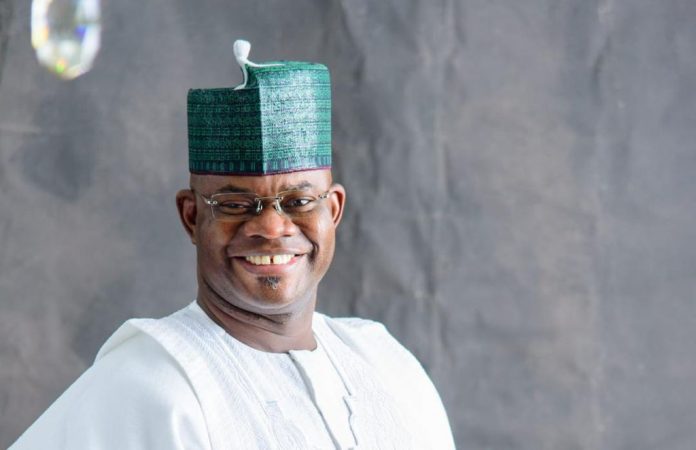Yahaya Bello: A Man of the People
By Nafisat Bello
“Good governance is the art of putting wise thought into prudent action in a way that advances the well-being of those governed.”
― Diane Kalen-Sukra
Dont get it twisted. This piece is not talking about the 1966 masterpiece with the same title. It is in fact talking about the exact opposite of it. The main character in this piece is the direct opposite of the main character in the 1966 thriller.
Africa’s greatest storyteller, Chinua Achebe, in his blockbuster novel which was said to be a prophetic rendition of the fate that later befell the nation, titled: “A Man of the People,” told a story of Chief Nanga, a minister in charge of protection of the peoples custom and tradition, who was supposed to be “a Man of the People” but who exploited the position to advance his personal wealth through corruption and greed.
With his ill-gotten wealth, Chief Nanga committed all manners of atrocities including snatching his mentee’s girlfriend. Odili, the mentee tried to get revenge by hunting down Nanga’s fiance but there was a major coup d’etat that threatened his dream revenge.
sing Odili, a school teacher, as the narrator, Achebe depicted the story of official corruption, incompetence as well as lavish cum reckless lifestyle of politicians that bedeviled the first republic, and somehow predicted the Nzeogwu-led coup that terminated the republic.
Unlike Achebe’s “Man of the People” who was a pretender and a corrupt government official, the governor of Kogi state, Yahaya Bello, is a genuine “Man of the People” with projects, policies and actions to show that he is a real patriot who has the interest of the people at heart.
Governor Bello does not joke with the welfare of Kogites. He adheres religiously to the provision of Section 14 (2b) of the Constitution of the Federal Republic of Nigeria, as amended, which states that: “The SECURITY and WELFARE of the people shall be the primary business of government.”
But first, let us examine the evolution and essence of Minimum Wage.
The Minimum Wage law was first introduced in Australia and New Zealand in an attempt to raise the income of unskilled workers. But nowadays, most modern developed economies, as well as many underdeveloped economies, enforce a national minimum wage.
The sole objective of minimum wage law is to prevent employers from exploiting workers, provide enough income to afford a living wage, the amount needed to provide enough food, clothing, and shelter.
Minimum wages have been defined as the minimum amount of remuneration that an employer is required to pay wage earners for the work performed during a given period, which cannot be reduced by collective agreement or an individual contract.
Read Also:
More so, it is imperative to further understand that Nigeria’s minimum wage lags behind its global peers, thanks to economic factors related to earning. The MINT nations, which Nigeria is part of, is made up of developing economies with proper formal diversified economic sectors, which have made minimum wage implementation less of a hassle as wages have grown significantly over the last 20 years compared to Nigeria.
The MINT (Mexico, Indonesia, Nigeria and Turkey) nation was coined in 2013 by economist Jim O’Neill, the same person who popularized the term “BRICs.”
The countries selected on the MINT list were measured on multiple factors including, economic growth, age demographics, geography, internet adoption, and many more.
According to a GDP per capita of $9,946 in 2019, the Mexican National Minimum Wage Commission announced its decision to increase the general minimum daily wage to 141.70 Mexican pesos (approximately US$7.10) in 2021. In Indonesia, they had a GDP per capita of $4,130 in 2019, and it has grown over 5 times in the past 20 years.
Turkey, a founding member of the OECD and NATO, had a GDP per capita of $9126 in 2019, growing nearly 3 times in 20 years. The Turkish Government raised its minimum wage by 21.56% as of January 1, 2021, to $377 a month for single people.
All the MINT nations were included in the list for their growth capacity for the next 20 years. Nigeria seems to have regressed with gains it made when the list was made. While other members of the club have grown earnings by 3 to 5 times over in the past 20 years, Nigeria’s GDP per capita is the same level it was 40 years ago.
Tim Callen, the Assistant Director in the IMF’s External Relations Department, therefore said in a 2020 report that “an increase in real GDP is interpreted as a sign that the economy is doing well. When real GDP is growing strongly, employment is likely to be increasing as companies hire more workers for their factories and people have more money in their possession.”
However, It Is anticipated that Nigeria may not catch up with its MINT counterparts anytime soon, as the IMF forecasts that Nigeria’s real GDP growth in 2021 is expected to turn positive at 1.5%, while real GDP is expected to recover to its pre-pandemic level only in 2022.
When President Muhammadu Buhari, a few years ago, signed the national minimum wage bill of N30,000 into law for immediate implementation, some state governors opposed it, saying they could not afford to pay.
While many states of the federation still maintain that they cannot afford to pay, Governor Bello recently took the bull by the horns and ordered that the state begin the full implementation of the N30,000 minimum wage with immediate effect.
Mrs Folashade Arike Ayoade, Secretary to the Kogi State Government, made the announcement on behalf of the governor, sparking jubilation across the state.
Since the announcement, the name of Governor Bello has been on the lips of the people. They call him the “Man of the People.”
Governor Bello is that “Man of the People” that Achebe’s fictional character needs to emulate.
















